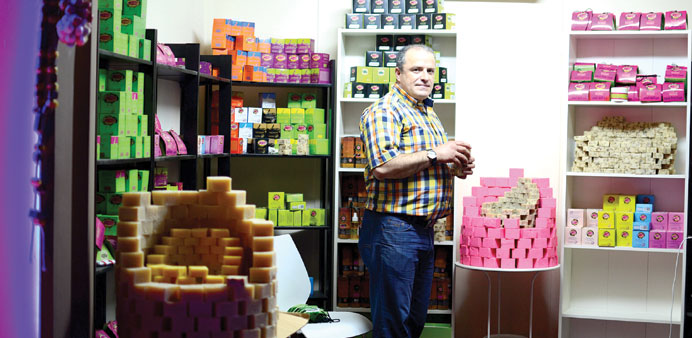By Anand Holla
While brand after brand routinely claim to be a one-stop-shop for all your needs, precious few live up to such a weighty promise.
As part of Ramadan festivities, a new Lebanese handmade soap stall sprung up by the Katara beach is selling fragrant soaps for every requirement using every conceivable organic ingredient – and the results look impressive.
Natural soaps have gained a lot of following but not all can claim to use natural ingredients. Abdul Wahed Hassoun can guarantee that and more about his brand Tripoli Soap, owing to his family’s soap-making tradition for generations.
Hassoun says, “Tripoli in North Lebanon has been famous for its olives, olive oil and soap manufacturing for hundreds of years. It was also the first city to export soap (from the region) to Europe through the Gate of Turkey, more than 300 years ago.”
However, in the beginning of the last century, most of the soap factories shut down and made way for other businesses. “Only a few of us were left, thereby turning soap manufacturing into a craft among other traditional crafts through which we preserved and developed important recipes to create natural soaps for various skin types and preferences,” Hassoun explains.
His outlet in Katara, which will be open through Ramadan, sees a steady stream of buyers, who take in deep whiffs of the rather diverse collection. A mini pyramid of soaps with flower extracts, perfumed rose and honey, sit next to a plethora of choices: strawberry, apple, rosemary, violet, lavender, olive oil, spearmint, chamomile, seven oil with honey, almond, musk, walnut leaves, and so on.
“I produce a massive range of soaps at my Tripoli factory and I use 100 per cent natural ingredients and pure olive oil,” Hassoun says, “Although I started this brand only 15 years ago, my family has been making soaps for several decades and they never cared about branding their products because brands didn’t matter then. I hope to start a shop soon here in Qatar.”
Hassoun’s soaps are made with the cold process, which differs from the hot process method in that it does not utilise heat after the saponification process has taken place. Though a lot more time consuming, the cold process method is regarded as the finest method to create the highest quality soaps.
“We use cold process method for all our soaps, also, because these soaps are much better on skin and this process allows total control over the use of ingredients,” Hassoun points out, “We extract the essential oils from peppermint, bay leaves, rosemary, lavender, and parsley, and maximise the benefits of these ingredients.”
The Tripoli Soap list of specialties is long. The parsley oil soap cures dandruff and eczema and psoriasis, the parsley oil soap with dill purifies skin, closes pores, prevents face wrinkles and gets rid of blackheads, black cumin soap boosts skin immunity, green tea soap rejuvenates skin and fights skin fatigue, curcuma soap helps remove freckles and spots and lightening dark areas of the face, and myrtle soap arrests hair loss.
“Our Wheat Bran-Oat soap is a hit for how it effectively purifies skin and rids it of blisters and freckles when applied regularly on the entire face,” says Hassoun, while referring even to their line of skin creams and beauty oils, “We know which ingredients work best in cleansing our bodies, what’s good for face, hair, sensitive skin, dry skin, allergic skin, you name it. Our aromatherapy series, for instance, features honey soap that leaves your body fragrant for long and the expensive but wonderful Sandalwood with Damascus Rose.”
Hassoun’s big, scented heap of healthcare-cosmetic solutions may be just what people of Qatar may be interested to explore. Hassoun says, “In Qatar and elsewhere in the Gulf, the heat is too much and the skin eventually suffers. Not only the weather but even the water here is harsh on the skin, making it susceptible to allergies, eczema, or psoriasis. But whatever your bathing requirement be, rest assured that we have just the right solution for it.”

THE SHOP: Abdul Wahed Hassoun at his soap outlet by the Katara Beach. Photos by Anand Holla
